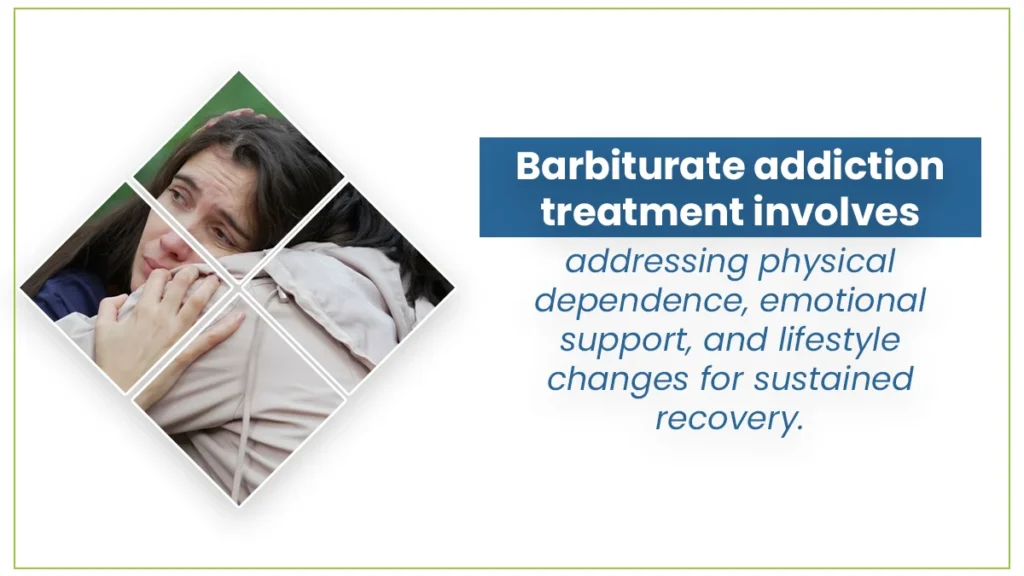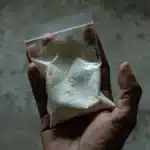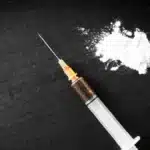Barbiturate addiction, one of the serious medical conditions affecting many in the United States, occurs when individuals develop a dependency on these central nervous system depressants. Barbiturates are often prescribed to treat anxiety or sleep disorders.
These medications, when misused, can lead to tolerance and addiction. Barbiturates slow down brain activity, causing relaxation and drowsiness. Over time, individuals may use high doses to achieve similar effects, leading to addiction.
Recovery from barbiturate addiction involves a comprehensive treatment approach. This article will look into the various proven strategies for barbiturate abuse treatment, shedding light on the importance of professional guidance and support in overcoming addiction.
Key Takeaways
Barbiturate addiction involves the compulsive use of barbiturate drugs, impacting physical and mental health. Here is what you need to know:
- Identifying the signs is crucial for early medical intervention and support for those struggling with barbiturate addiction.
- Identifying physical, psychological, and behavioral signs is crucial in recognizing barbiturate addiction and intervening effectively.
- Effective treatment involves a detox process, residential rehab, and aftercare programs to support individuals in their recovery.
- Successful treatment integrates MAT, therapy, support groups, education, family involvement, and lifestyle changes.
Contact The Haven Detox-Little Rock at (501) 271-3342 to access compassionate support and effective treatment for substance abuse issues.
Recognizing Barbiturate Addiction: What to Look For
Addiction to barbiturates can manifest through various physical, psychological, and behavioral signs. It’s important to note that addiction can vary in intensity and presentation from person to person. Here are some indicators to look for:
Physical Symptoms
Physically, someone addicted to these sedative-hypnotic medications might display symptoms like:
- Slurred Speech: Difficulties in speaking clearly and coherently.
- Coordination Issues: Unsteady movements, lack of balance, or clumsiness.
- Drowsiness or Sedation: Constant tiredness, excessive sleepiness, or frequent nodding.
- Constricted Pupils: Pinpoint pupils that are smaller than usual.
- Respiratory Depression: Shallow breathing or slowed breathing rate.
- Nausea and Vomiting: Frequent feelings of nausea and episodes of vomiting.
- Tolerance and Withdrawal: A person may need higher doses over time to achieve the desired effect and experience withdrawal symptoms when not using them.
Behavioral Signs
Behaviorally, changes might be noticeable as well, including:
- Drug-seeking Behavior: Constantly trying to obtain more of the drug, even at the expense of personal responsibilities.
- Social Withdrawal: Pulling away from family and friends or isolating oneself.
- Neglecting Responsibilities: Ignoring work, school, or personal obligations.
- Secretive Behavior: Hiding the use of drugs, being evasive about activities or whereabouts.
- Continued Use Despite Consequences: Using the drug despite knowing it’s causing physical, psychological, or social harm.
- Doctor Shopping: Seeking multiple prescriptions from different doctors or engaging in deceptive practices to obtain more medication.
Psychological Symptoms
On the psychological front, someone struggling with barbiturate abuse issue may show signs of:
- Mood Swings: Rapid changes in mood from extreme highs to lows.
- Anxiety or Agitation: Feeling anxious, restless, or agitated without the drug.
- Depression: Prolonged feelings of sadness, hopelessness, or disinterest.
- Confusion or Disorientation: Difficulty concentrating, memory problems, or confusion.
- Irritability: Easily becoming frustrated or irritated.
- Paranoia or Hallucinations: Experiencing false perceptions or beliefs or feeling overly suspicious.
These signs and symptoms of barbiturate addiction can vary depending on the individual and the severity of addiction. Someone exhibiting several signs might indicate a need for professional help or intervention.

Barbiturate Addiction Treatment
Barbiturate addiction treatment program typically involves a combination of approaches to address physical dependency, psychological aspects, and ongoing support. Here’s a breakdown of the treatment methods:
Medical Detoxification
Medical detoxification is the initial phase of treatment for barbiturate use disorder. Detox treatment involves supervised withdrawal in a controlled setting, ensuring safety and comfort while the body rids itself of the drug. Medical professionals monitor and manage withdrawal symptoms, which can be severe, to ease the transition into sobriety.
Residential Rehabilitation
Residential rehabilitation programs offer intensive, inpatient treatment for barbiturate addiction. These programs provide a safe, structured environment where patients receive individual and group therapy sessions and support 24/7. They focus on addressing the root causes of substance use disorder (SUD), teaching coping mechanisms, and promoting a drug-free lifestyle.
Aftercare Programs
Aftercare programs are crucial for maintaining sobriety after completing formal treatment. These programs offer ongoing support through various means, such as outpatient addiction treatment, support groups, and continued counseling. Aftercare helps individuals navigate challenges in their everyday lives while reinforcing the skills learned during treatment.
Barbiturate addiction treatment combines these strategies to provide a comprehensive approach to recovery. Each step aims to address different aspects of addiction, offering individuals the tools and support needed to overcome physical and psychological dependence and live a fulfilling, drug-free life.
Keys Elements in Addiction Treatment
Barbiturate addiction treatment typically involves a multifaceted approach that combines medical, psychological, and social elements. Here are some of those elements:
Medication-Assisted Treatment (MAT)
Medication-assisted treatment (MAT) involves using medications, in combination with counseling and behavioral therapies, to address barbiturate dependence. These medicines help manage severe withdrawal symptoms and cravings, supporting individuals through the recovery process. They work to restore balance in the brain affected by prolonged substance use.
Therapy and Counseling
Therapy and counseling sessions are integral parts of barbiturate addiction treatment. These sessions help individuals understand the root causes of their addiction, develop coping strategies, and learn healthier ways to manage stress and emotions. Cognitive-behavioral therapy (CBT) is commonly used to modify harmful thought patterns and behaviors associated with the abuse of barbiturates.
Support Groups
Support groups provide a sense of community and understanding. These groups, such as Narcotics Anonymous (NA) or SMART Recovery, offer a platform for individuals to share experiences, gain support, and receive guidance from peers who have faced similar challenges. Being part of a support group reinforces the commitment to sobriety.
Education
Education about addiction and its adverse effects is a vital component of treatment. Understanding how the use of barbiturates affects the body and mind helps individuals make informed decisions about their recovery. Education equips them with the knowledge to recognize triggers and develop relapse prevention strategies.
Family Involvement
Involving family members in the treatment process fosters a supportive environment. Family therapy sessions educate loved ones about addiction, improve communication, and create a network of encouragement for the individual in recovery. In addition, family involvement enhances the overall success of treatment.
Lifestyle Changes
Making positive lifestyle changes is integral to successful recovery. This includes adopting healthier habits like regular exercise, proper nutrition, and stress management techniques. Engaging in activities that promote well-being and avoiding environments that may trigger substance use are crucial elements of a drug-free lifestyle.
Each of these elements plays a vital role in supporting individuals through their recovery journey, addressing various aspects of addiction for long-term success.
Frequently Asked Questions (FAQ)
Being addicted to barbiturates means experiencing a strong dependence on these drugs. Addiction leads to compulsive use despite harmful consequences. It involves a cycle of needing more of the drug to achieve the same effect, causing physical and mental health problems. Barbiturate addiction can disrupt daily life, impacting relationships, work, and overall well-being.
Barbiturate withdrawal refers to the body’s reaction when someone stops using these drugs after prolonged use. It triggers physical and mental symptoms like anxiety, insomnia, tremors, changes in heart rate, and seizures. These symptoms arise as the body adjusts to functioning without the presence of barbiturates, making withdrawal a challenging and potentially dangerous phase.
Barbiturates belong to the class of drugs known as central nervous system (CNS) depressants, prescribed for insomnia or anxiety disorder. They slow down brain activity, inducing relaxation and drowsiness. However, these drugs carry a high risk of overdose and dependency and can lead to addiction if not used as directed. Medical supervision is crucial due to their high potential for misuse and serious side effects.
Reclaim Life’s Harmony at The Haven Detox-Little Rock
Embarking on the journey to recovery is a courageous step, and The Haven Detox-Little Rock is here to guide you every step of the way. If you’re struggling with barbiturate addiction, medical help is within reach.
Our comprehensive addiction treatment services start with medical detox, ensuring a safe and supported process as your body rids itself of harmful chemicals. It also includes our residential treatment program, which equips you with the tools, therapy, and medical support necessary for lasting recovery.Don’t wait to take the first step toward reclaiming your life. Contact us at (501) 271-3342 to break free from addiction.




